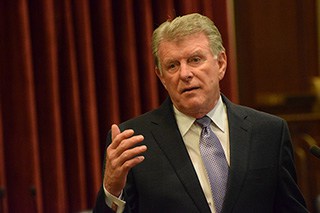


As we look ahead to the new year, a new state government administration, and the 2019 legislative session, I offer the following select thoughts. The elections are over, it's time for elected officials to dig in to do the hard work. So, let's begin with chocolate.
I have a Christmas candy theory: People who prefer dark chocolate to milk chocolate will still eat milk chocolate if it’s offered. But people who prefer milk chocolate will usually refuse dark chocolate in most scenarios that don’t involve starvation. Similarly, and because I like to mix chocolate and politics (to help the latter go down easier) it’s been my experience that an Idaho legislator who might not care too much for tax cuts often could vote for one if presented the opportunity. But many of those same legislators would be hard pressed to even think about spending cuts.
Some economic indicators are starting to point toward the possibility of a recession. Now’s the time for legislators and Gov.-elect Brad Little to, as my metaphor goes, to start developing a taste for dark chocolate. Don’t wait for an economic downturn to direct state agencies to curtail unnecessary spending.
As he takes office, Little would be wise to put in place a freeze on hiring and capital expenditures. Little should recommend, and the Legislature should accept, a reduction in current-year agency spending plans. Additionally, both the governor and Legislature should have the discipline to impose frugality on agencies and programs for the budget year that begins July 1, again, mindful of a softening economy.
I know the request for spending restraint comes as a quarter of state lawmakers are new and haven’t yet found the bathrooms. Thus, leadership from Little will be a must. Acting decisively now—changing the state’s spending direction before we really, really have to—is always a heck of a lot easier than having to make deeper cuts or stave off calls to raise taxes.
---
It’s no secret, in recent years I’ve been a regular critic of Gov. Butch Otter. But the governor was on the receiving end of a ridiculously unfair, completely biased news story that recently ran in Idaho’s newspapers. The article noted that Otter had appointed 7th District Judge Greg Moeller to the state Supreme Court. The article, unfortunately, focused entirely on the fact that Moeller was “the only man on a list of four finalists submitted to him by the Judicial Council. The other three finalists all were women.”
The rest of the article was about the number of women jurists in Idaho and the state’s ranking in that regard compared to other states. Folks, this is what we in the journalism biz used to refer to as “agenda setting,” telling readers what they should view as important based on the writer and/or editor’s world view. It used to be considered a no-no. An appropriate story on Otter’s appointment—and there are examples of the same—would note Moeller’s appointment, his background, credentials, and judicial record, along with information about who else was in consideration, so that the reader can draw their own conclusions about details they might deem important or not.
---
The College of Western Idaho still manages to surprise me. A couple of years ago, the school used public money—student fees—to try and convince voters to approve a bond. The attempt failed, but the college’s campaign tactics were part of the reason the Legislature passed a bill, signed by Otter, to limit how government entities use
Yet, clever little CWI can’t be stopped. The school asked for a recount. Typically, recounts are used by candidates who come within a whisker of winning. Someone might refresh my memory, but I don’t recall ever seeing a taxing district choosing to put taxpayers through the expense and ordeal of ordering a recount. I had to look up the recount statute, which I thought I knew fairly well. Sure enough, state law allows it. I’m thinking that maybe it shouldn’t.


